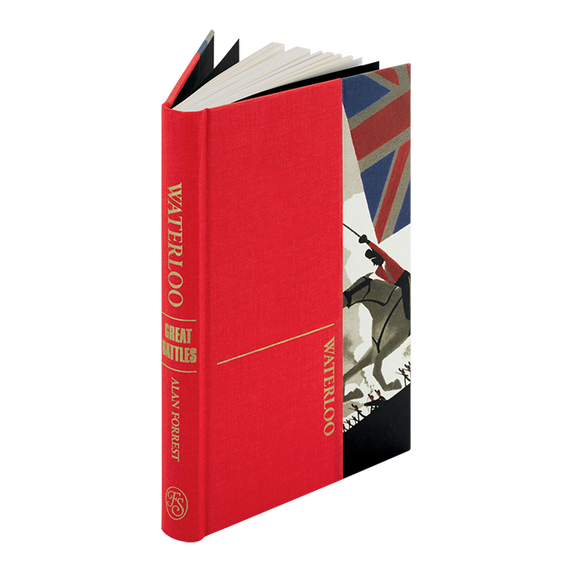
Waterloo
Waterloo by Alan Forrest launches a major Folio series on history’s greatest battles, providing a vivid account of Napoleon’s defeat by Wellington and its legacy throughout the world.
Introduced by the author
Series editor: Hew Strachan
Thermopylae by Chris Carey is a worthy addition to The Folio Society’s Great Battles series – a masterful account of the Greeks’ celebrated stand against the Persians and its cultural legacy.
‘Excellent ... a considerable addition to the history and cultural legacy of one of the world’s most significant battles’
- Paul Cartledge, Literary Review
In this gripping study, classical historian Chris Carey chronicles a battle he describes as ‘the very first last stand in world history’. In 480 BC, a desperately outnumbered Greek army faced a massive force of Persian invaders in the narrow pass of Thermopylae – miraculously holding their ground for three days before being driven into retreat, their commanders and rear-guard slaughtered. Carey explores how Thermopylae, like Waterloo, Dunkirk and the Alamo, became a byword for heroism in the teeth of defeat. This lavish edition is the second in The Folio Society’s Great Battles series, following Alan Forrest’s acclaimed study of Waterloo. It includes 16 pages of colour images, featuring sculpture, ceramic art, paintings and public monuments inspired by the battle. With landscape photography, hand-drawn maps by Kevin Freeborn and battlefield plans, this is the authoritative companion to one of the most significant episodes in classical warfare.
Quarter-bound in blocked cloth, with textured paper sides printed with artwork by Geoff Grandfield
Set in Garamond
232 pages
16 pages of colour plates, plus 14 integrated photographs and 7 integrated maps
Plain slipcase
9˝ x 5¾˝
‘Very readable, well-researched and thought-provoking ... an excellent book and thoroughly recommended’
- Chris May, Battlefield magazine
Thermopylae is a worthy addition to The Folio Society’s Great Battles series, selected and edited by the distinguished military historian Hew Strachan. Each book is written by an expert in its field, drawing on the latest research to revisit and reassess the world’s most iconic military engagements. Like its sister volume Waterloo, Thermopylae aims not just to present a comprehensive account of the battle, its causes and its aftermath, but to place it in historical context. With a remarkable breadth of focus that encompasses Roman rhetoricians, the Napoleonic Wars, the Battle of Stalingrad and memorials to the 9/11 attacks, Chris Carey sets out the far-reaching legacy of Thermopylae, and the enduring power of its myth.
With little reliable historical evidence, the most famous battle of the Persian Wars defies attempts to untangle fact from fiction. Chris Carey brings a keen, forensic intelligence to bear on the writings of Herodotus and the few other sources that exist, tackling long-disputed questions: were there really just 7000 Greeks facing a million-strong Persian army? His study of the battle’s afterlife in legend, making up almost half the book, is equally comprehensive and compelling. Carey shows how the story captured imaginations in both the ancient and modern worlds, inspiring works of literature, great speeches, monuments and Hollywood blockbusters – and why figures throughout history have tried to steal some refracted glory from the doomed King Leonidas and his valiant Spartans.
Chris Carey was born in Liverpool and educated at Jesus College, Cambridge. He has worked at the University of Cambridge, the University of Minnesota, Carleton College, St Andrews, Royal Holloway and UCL. He has worked on Greek lyric poetry, epic, drama, oratory and law, and is currently working on a commentary on book 7 of Herodotus’ History. He was elected Fellow of the British Academy in 2012.
Hew Strachan is a British military historian and one of the world’s foremost experts on the First World War. He has held many university posts and is currently Professor of International Relations at the University of St Andrews. His books include: The First World War (2003; new edn 2014), The First World War in Africa (2004), Clausewitz’s On War: A Biography (2007) and The Direction of War (2013).
